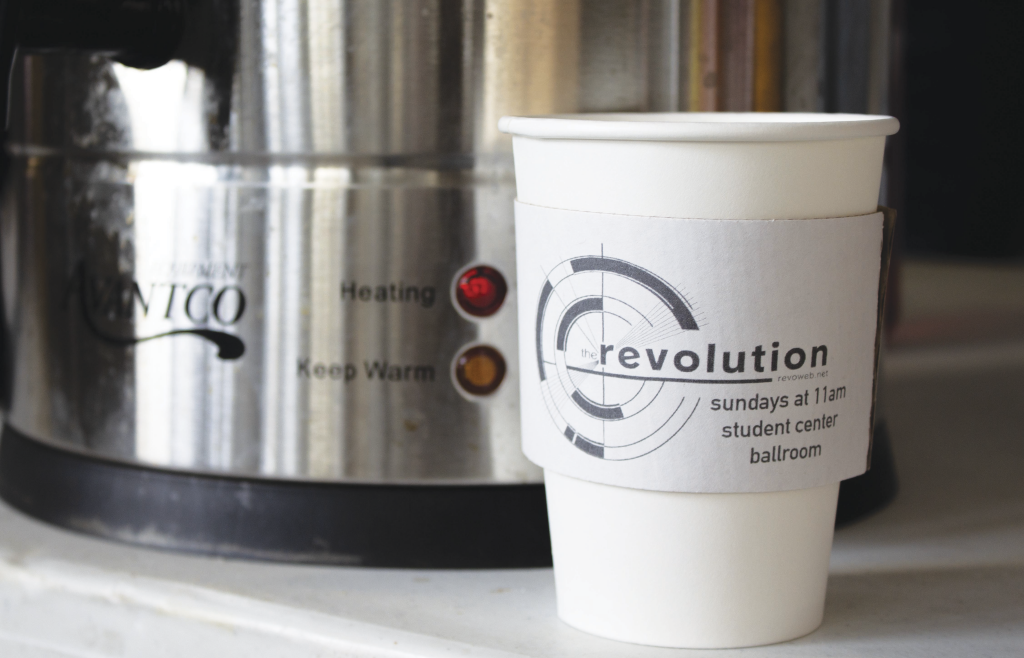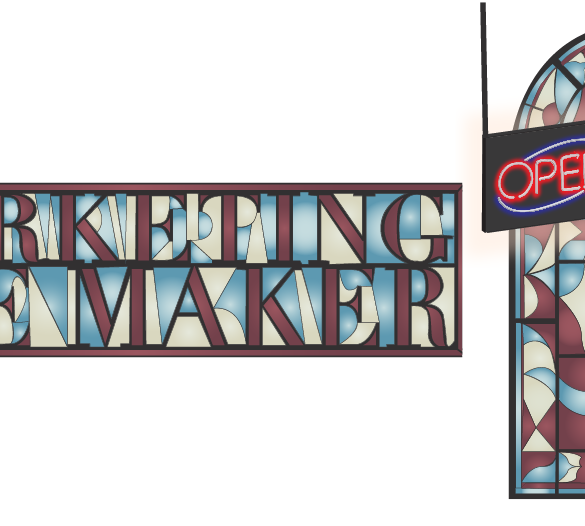As young people stray away from organized churches, college religious groups look for new strategies to promote their services.
Breia Sangster isn’t wearing a white shirt and a black tie. Clad in a Love PINK jacket, sweatpants, and boots, she holds only a deck of cards—not a Bible. Getting up from her table in the busy L.A. Pittenger Student Center, she and a friend walk over to a girl who is sitting alone and looking at her phone.
Breia asks if she can sit down and have a conversation. It’ll only take five minutes. The girl, Alia, agrees, and the conversation begins.
Alia’s a freshman telecommunications major, and it turns out she and Breia went to the same high school. They talk about who they might know, Alia pulling up a picture on her phone and Breia studying it. Then Breia asks if they can have a different conversation, one that’s a different kind of getting to know you. She pulls out her deck of cards, using them as visual aids as she asks question after question.
“How do you evaluate the meaning and purpose of life?”
“What do you think Jesus really said and did?”
“How do you know these are the best ways to find your truth?”
Alia’s friend eventually joins her, and they both consider these questions. There’s nervous laughter at first, then silence, as they both think long and hard about their answers.
Breia isn’t uncomfortable. She waits for Alia’s responses and asks follow-up questions to everything she says. They begin to talk about spirituality, morals, human nature, and Alia’s point of view on all of it.
Alia thinks the human race is a broken one. She hopes in her life she will overcome all her struggles, and she hopes the same for her family. She wants to live for others, and she thinks the truth is relative.
All of that from a five-minute conversation.
Breia does this at least once a week. And she’s scared every time, but she doesn’t let that stop her.
She always prays beforehand, asking God for one thing: courage. The courage to find the right person, and the courage to speak to them. So far, God hasn’t let her down. He helped her raise $3,000 in two weeks to go on a mission trip to Chicago. He helped her walk up to a lawyer at her church and ask for an internship, which she then received. And every week, God helps her swallow her fear and ask a stranger to have an existential conversation at 1:30 in the afternoon.
Breia is a member of Impact, the primarily African-American division of a campus religious organization called Cru. She shares what they call Perspective Cards, an outreach tool used by Cru members, to start conversations with people about their beliefs concerning God and the world. She always has the cards with her. She never knows when she might need to use them.
Breia says outreach helps her connect to people, and seeing those connections formed is what motivates her to keep doing it.
There are 50 Perspective Cards, broken down into five categories: “Nature of God,” “Meaning and Purpose of Life,” “Human Nature,” “Jesus was,” and “Sources of Spiritual Truth.” Each category has several options. “Players” choose the options that represent their perspectives, and then they explain their decisions. The conversation isn’t one-sided, though. After the cards are finished, Breia will use the same cards to share her own beliefs. At the end of the conversations, Cru members usually give the people they speak with a booklet called “Knowing God Personally,” or KGP, as Breia calls it.
Breia’s job involves navigating the complex system of religious marketing, a sensitive subject for many people. In a college setting, with so many organizations to choose from, campus religious groups and the people who market for them are trying to figure out new ways to promote their “brands” while still maintaining the authenticity of their faiths.
Brooke Mayer, a Cru intern at Ball State University, says she likes Cru’s outreach strategy of the cards because it involves allowing others to state what they believe before telling them what she believes. She, too, always has these cards handy. She keeps the Perspective cards in her purse, along with another set called Soularium cards.
The Soularium cards also help start conversations, Brooke says. These cards also come with a series of questions, which people answer using the images on the cards.
Brooke says she thinks the cards are effective because people want to feel listened to. They don’t want to just hear someone talk about why they’re Christian, and they don’t want someone to listen just enough that they can make their next point. They want to feel like a Christian is actually listening to their side of the story.
This strategy is being used during a time when the teachings of Christianity are being heavily questioned. A 2014 Pew Research Center study reported religious “nones,” or those who choose not to identify with any religion, are rapidly growing. In the span of seven years, nones had seen an increase of more than 50 percent in the United States.
In a 2018 study, Pew Research found the biggest reason non-religious individuals say they choose not to identify with a religion is that they aren’t sure they believe religious teachings. The second reason is that they don’t agree with the political or social stances churches take.
Still, the majority of Americans seem to believe in God, according to a 2018 Gallup poll. While 87 percent still think God exists, 76 percent said religion does not have as much influence as it used to.
John Schmalzbauer, a Missouri State associate professor of religious studies, says young people have changing attitudes toward religion and might not like how structured or politicized it is. He says it’s important for religious organizations to be sensitive to how other students might react to marketing. Churches shouldn’t come across as too aggressive, deceptive, or manipulative with their marketing techniques.
Because of this, Schmalzbauer says churches can market much like secular businesses, but they need to be careful with how hard they are “selling” themselves. Some people might feel as if churches are trying to force beliefs on them. Schmalzbauer believes campus religious groups can use the strategy of tailoring their messages to specific niches. Cru has done this with several subcategories of the organization that cater to specific audiences—Impact, the division Breia is a part of, Greek Cru, directed at sorority and fraternity members, and Athletes in Action, Cru for student-athletes.
While Schmalzbauer thinks churches just need to be cautious in their marketing efforts, some people believe churches shouldn’t be allowed to market at all.
The 1994 paper “Can (Should) Religion be Marketed?” by Bruce Wrenn listed reasons why some religious leaders thought church marketing was unethical. Some believed marketing was too expensive, manipulative, or intrusive. Others worried marketing efforts could contradict church beliefs, especially if churches shape their messages to fit the lifestyles of potential members instead of the other way around.
The 2014 paper “Operationalizing Marketing in the Church” published in the Nigeria Journal of Business Administration acknowledges these issues but also argues the church is still in the service industry. Things like weddings, baptisms, and funerals could all be considered services in the marketing world.
Marketing for nonprofits can be difficult because they don’t have specific “customers” or tangible products. To help with this, the paper offers a comprehensive marketing plan churches can stick to.
The basics of the plan involve using marketing to help the church make potential members realize a need, whether that be spiritual or physical, then show how the church can meet this need. Effective marketing should also help churches raise money to accomplish their missions and boost membership.
Courtney Bishop, director of marketing for The Revolution, a campus Christian organization at Ball State, has experienced the challenges of balancing marketing with the sensitive nature of religion.
[epq-quote align=”align-left”]“You have to be more cautious…you’re held to a different standard.”
– Courtney Bishop[/epq-quote] “In some ways, you have to be more cautious,” she says. “I think a little bit you’re held to a different standard.”
Bishop knows religion is a tough subject for many people. She says she is aware of the line she walks in her job between having to market a “brand” but still maintaining the authenticity of religion.
“I think we have to be careful in the way we communicate so that it’s not pushy or manipulative.”
Bishop understands her audience of college students, and she’s found the biggest thing they respond to is free items. Things like handing out free coffee on cold mornings or snow cones during the hot days of August fulfill an easy, immediate need of college students. That’s not all there is to it, though. Bishop says it’s important to use those immediate needs to open the doors to fill bigger ones. While waiting for their snow cones to be made, students can talk to someone about church and what it can do for them.
Bishop has seen outreach work for people. She thinks one of the best examples is Chris.
Free Salvation
Chris Portillo joined The Revolution because of a free T-shirt. Wandering around campus during his first week as a Ball State freshman, Chris saw a group of people handing out snow cones to returning students. He asked them if they were a church. He’d been hoping to join one when he got to college. Pastor Carl Frost said they were.
And if you come to my service Sunday, I’ll give you a free T-shirt.
Right on, I love free T-shirts, Chris said.
That Sunday, Chris went to church. He got his T-shirt. He even won a Starbucks gift card.
“I was like, man, I definitely gotta stay here now,” he jokes.
Chris joined The Revolution because of a free T-shirt, but he stayed because he trusted God.
That summer, before freshman year, God had spoken to Chris during a sermon for Young Life Camp, a Christian organization for high schoolers. He asked Chris to come back to Him. The sermon was about running, something Chris knew he’d been doing a lot of lately.
When Chris started high school, he joined Young Life to try and stay connected with God, but he soon found friends outside of the group. These new friends would smoke and drink and party, inviting Chris to come along, which is when the running began.
But that changed that summer. Chris was going to college soon, and he wouldn’t have those friends anymore. All he had was himself and his girlfriend, with whom he said he was in an unhealthy relationship. And he had that call from God to follow.
He kept going to The Revolution, and he grew close with the people there. He broke up with his girlfriend a month after starting college, when The Revolution helped him realize what a good relationship should look like. It was hard, but he knew it was what he had to do. Christopher Glotzbach, a campus staff member, helped him adjust to his new life.
“It was just amazing to see the way he connected with people,” Chris says about Glotzbach. “He could talk to anybody and was fearless. And so, I wanted to be that, as well.”
Lifesavers
 Glotzbach helps run coffee at The Revolution, an outreach event every Tuesday morning. Normally, they hand out cups at the Scramble Light, but on this cold, foggy Tuesday, they are in the Letterman Building lobby.
Glotzbach helps run coffee at The Revolution, an outreach event every Tuesday morning. Normally, they hand out cups at the Scramble Light, but on this cold, foggy Tuesday, they are in the Letterman Building lobby.
“Free mediocre coffee and lukewarm hot chocolate!” Glotzbach calls to passing students. “But it’s free!”
It’s been a rough start to the day. They were supposed to start setting up the coffee station at 8 a.m. They started at 8:08. Bishop, the director of marketing, accidentally spilled coffee grounds into the big coffee urn, which meant Glotzbach had to dump it all out and refill it. He then forgot to push start, delaying the brewing process even further.
So now the coffee is, as Glotzbach calls it, “free water with a hint of coffee.”
But he’s not discouraged. In fact, he’s cheerful about the entire situation. Sitting with Bishop and another staff member, he greets tired student after tired student, watching their faces light up as they smell the grounds brewing. He encourages them to come back later, saying they’ve had a difficult morning, but coffee will be ready soon enough.
Soon, students will be able to grab the tall white cups stacked up neatly in stands, grab a coffee jacket with The Revolution’s logo, social media, and meeting times, and pour themselves a steaming cup of coffee.
One student approaches the table, smiles, and grabs a cup.
“You guys are lifesavers.”
More of You
Chris needed a lifesaver. Sitting in the parking lot of the McDonald’s on McGalliard Road, he broke down crying and yelled at God.
God, I can’t do this on my own anymore.
It was Chris’ sophomore year at Ball State, and even though things had been going well with The Revolution, he was battling serious depression. He felt like everything was falling apart around him, and he was considering suicide. He cried and yelled, asking God for answers, calling out for help.
A song came on the radio, and Chris felt like his life was saved.
“More of You” by Colton Dixon floated through Chris’ car speakers. He felt like God was speaking directly to him.
More of You. Less of me. Those lyrics stuck with Chris. He says God was asking Chris to trust Him, to let Him take control.
After that, Chris placed all of his trust in God. He didn’t worry about the future, he just trusted that God would take care of it.
And according to Chris, God did.
Now far from the lost person he once was, Chris tries to change people’s lives the way his was changed.
In 2017, he graduated from Ball State, becoming the first person in his family to do so. He and his wife both got jobs in Indianapolis—she was a maternity nurse, and he worked for a supply chain doing logistics. But Chris says there was always just something about The Revolution that called him back. So he and his wife decided to move to Muncie in 2018 and join the staff as campus missionaries.
It was hard, especially since The Revolution staff members must raise money to fund their own salaries. Chris remembers having to break this news to his parents, who didn’t react well at first. He was going to quit his steady job and have to live off the charity of others, but he wasn’t too worried.
More of You. Less of me.
Now Chris says after all these years, he is finally learning to accept himself. He isn’t mad at God anymore, and he tries to help others who feel disillusioned by the church.
He understands why people would feel unaccepted in religious communities. He knows what it can be like to feel like the church is full of hypocrites. But he thinks the goal of church is to recognize that everyone has flaws, and then try and get better as a community.
Chris says he knows the Bible makes it clear that Christianity accepts all people.
He knows he can’t prove this to everyone. He just hopes he can share his message, and he trusts God with the rest.
Connection
Breia packs up her cards and sits back down at her table. She had given Alia her phone number, in case she ever wanted to come to Bible study, and she hopes Alia will text her.
Breia, too, knows she can’t tell everyone the gospel. She just wants to have real conversations that get through to people. She, like Chris and Brooke and Bishop, just wants to connect to someone. She checks her phone to see if Alia texted.
Alia did.




